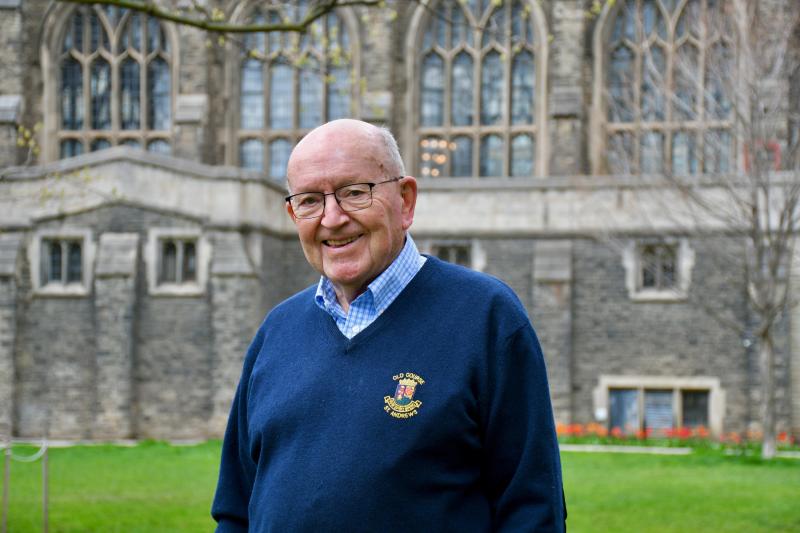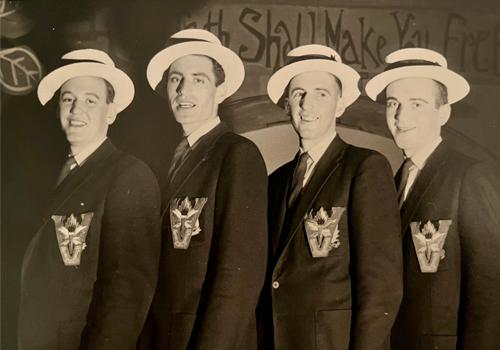June 21, 2024 | Alumni
Still singing after all these years, Bob Burrows’ barbershop quartet finds new life in digital form
By Adam Elliott Segal

Bob Burrows in front of Burwash Hall, Victoria College. Photo by Diana Tyszko.
It had been more than half a century since the walls of Emmanuel College echoed with the smooth bass of Bob Burrows’ (BA 1956, MDiv 1959) voice, but last month his dulcet tones graced the halls once again.
The 89-year-old minister earned his bachelor of arts in 1956 from Victoria College and a master of divinity from Emmanuel College in 1959, but he has especially fond memories of the latter. From a chair outside the registrar's office on a recent campus visit, the retired minister is greeted with hugs from principal Hyeran Kim-Cragg and other staff who recognize him.
“I spent half an hour going through this building, looking at the pictures on the wall,” says Burrows. “I finally found our graduating class,” which consisted of 32 students in 1959.
Burrows points to the lecture hall just off the foyer where members of the barbershop quartet, The Four Collars, had their a-ha moment.
Ron Evans, lead singer in the quartet, had been sick for two weeks. His replacement, Howard Mills, possessed some vocal chops himself.
"We were in the lecture hall having our daily rehearsal,” recalls Burrows. “Ron came in and said, ‘The blend is fantastic. Howie, you’ve got to stay.’”

Evans, “more musical than any of us,” became their number one supporter after the gesture to drop out of the group. The Four Collars — Howard Mills, Hugh McKervill, Norm Thomas and Burrows — sang at events across the University of Toronto campus and church services in the Toronto area.
“Once we started, we couldn’t stop. We were almost addicted to singing,” says Burrows, who admits the quartet even skipped a lecture or two to practice.
The dedication paid off when they beat quartets from across the country at the Canadian Inter-University Barbershop Quartet Competition in 1958 in front of 800 people at Hart House.
They recorded 12 songs later that year, a mix of spirituals such as “Steal Away” and “Holy Ghost” alongside barbershop staples like “Coney Island Babe.” Only 150 vinyl records were pressed; few survived the test of time. But Burrows is nothing if not resourceful.
He plucked one of the few remaining records from the frame on the wall in his Vancouver home and booked an appointment at a library in North Vancouver that can digitize vinyl; the librarian is an amateur DJ with a weekly radio show back in his native Scotland.
“He took out all the six-to-eight second gaps,” says Burrows.
The album has been given new life on Soundcloud.
Emmanuel College is also where Burrows met his wife, Joan.
“We had our first date at the cafe across the street,” says Burrows, pointing to what is now Ned’s Cafe on Charles Street.

Following their marriage, they embarked on a year of study and teaching in St. Andrews, Scotland – Burrows loves golf and has been to the famous St. Andrews course several times for The Open since. The next year, he and Joan drove across Canada in a Volkswagen. They landed on BC’s west coast where Burrows served as minister and captain of a United Church mission boat. He then earned his pilot’s license and from Alert Bay, with a Cessna 170 float plane, served dozens of isolated communities on northern Vancouver Island and mainland inlets.
Burrows moved his family to Vancouver in 1966 where, along with Anglican and Roman Catholic colleagues, the Dugout Drop-In Centre was established to provide a daytime haven for downtown-east side men and women experiencing multiple challenges. He served as a minister at congregations across the Lower Mainland and wrote two books about the history of the United Church Mission Hospitals in western Canada and the story of First United Church in Vancouver’s downtown-eastside.
Despite living on the west coast, he never forgot his ties to the University of Toronto. He received an Honorary Doctor of Divinity in 2001 from Victoria College and in 2012 a similar honour from the Vancouver School of Theology at the University of British Columbia.
The bonds of friendship that formed through the barbershop quartet have grown stronger over time. When Mills died in 1993, Evans, in a full circle moment, rejoined the group 35 years after he reluctantly left, and they performed regularly at reunions in the years that followed.
The remaining Four Collars live in Halifax, Hamilton, Minden, Ontario and Vancouver, and while their crooning days are behind them, they keep in touch via email and telephone.
“For 68 years I’ve thought that what Ron did, leaving the group, was the most generous thing," says Burrows. "By thinking of other people, he changed our lives.”
Originally published by University of Toronto Faculty of Arts and Science

